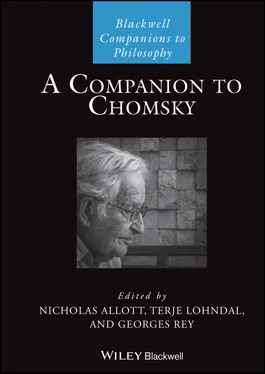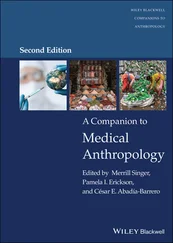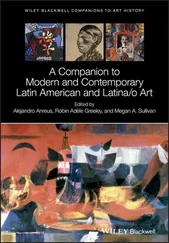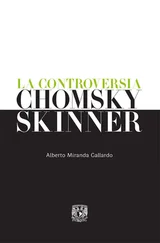A Companion to Chomsky
Здесь есть возможность читать онлайн «A Companion to Chomsky» — ознакомительный отрывок электронной книги совершенно бесплатно, а после прочтения отрывка купить полную версию. В некоторых случаях можно слушать аудио, скачать через торрент в формате fb2 и присутствует краткое содержание. Жанр: unrecognised, на английском языке. Описание произведения, (предисловие) а так же отзывы посетителей доступны на портале библиотеки ЛибКат.
- Название:A Companion to Chomsky
- Автор:
- Жанр:
- Год:неизвестен
- ISBN:нет данных
- Рейтинг книги:3 / 5. Голосов: 1
-
Избранное:Добавить в избранное
- Отзывы:
-
Ваша оценка:
- 60
- 1
- 2
- 3
- 4
- 5
A Companion to Chomsky: краткое содержание, описание и аннотация
Предлагаем к чтению аннотацию, описание, краткое содержание или предисловие (зависит от того, что написал сам автор книги «A Companion to Chomsky»). Если вы не нашли необходимую информацию о книге — напишите в комментариях, мы постараемся отыскать её.
Companion
Companion
A Companion to Chomsky
A Companion to Chomsky — читать онлайн ознакомительный отрывок
Ниже представлен текст книги, разбитый по страницам. Система сохранения места последней прочитанной страницы, позволяет с удобством читать онлайн бесплатно книгу «A Companion to Chomsky», без необходимости каждый раз заново искать на чём Вы остановились. Поставьте закладку, и сможете в любой момент перейти на страницу, на которой закончили чтение.
Интервал:
Закладка:
A further question, of course, is how a brain with such innate knowledge could possibly have evolved, an issue that Chomsky began to address in detail in the 1990s as one of the motivations for the Minimalist program. In Chapter 30, Anne Reboul discusses Chomsky's views on language evolution, noting that he has long held that the language faculty is a biological endowment, but that it probably arose suddenly and that the core principles of language show no signs of selection pressure. In work in recent decades he proposed that the sudden transition was the arrival of Merge, allowing for the production of hierarchical structures, initially used only in thought, but later externalized in speech. Reboul argues that work on evolution of language (and thought) also needs to account for the fact that human concepts, perhaps uniquely, are “decoupled” from external stimuli and so seem to be innately constrained along the lines of a Chomskyan theory.
Behaviorists such as Skinner and (more forcefully) the influential philosophers Nelson Goodman and Willard van Orman Quine were not only skeptical of the Rationalist's appeal to innate ideas; they were even more skeptical of what they called “the idea idea” itself, and thought serious science should avoid traditional appeals to internal (“private”?) mental states and properties of the sort that were presumed in Rationalist accounts that Chomsky seemed to want to revive (but see John Collins and Rey's contribution in Chapter 31for complexities here). They were particularly dismissive of the explanatory utility of talk of so‐called “propositional attitudes,” or talk that typically involves mental verbs, such as “believes,” “prefers” that take a “proposition” or “that…” or “to…” clause as a direct object; thus, one believes that it is raining and prefers to not get wet – i.e., that one not get wet, which is ordinarily supposed to explain someone's avoiding the rain.
All such talk involves a curious property that Franz Brentano (1874/1995) had called “intentionality,” or the “directedness” or “aboutness” of such attitudes on things real and often unreal, such as beliefs about Zeus and ghosts. Particularly for Chomskyans and other cognitive scientists, it would appear that the almost‐ubiquitous term representation is intentional in this way: representations are always “of” something, which can be real or nonexistent as in the case of illusory triangles and unuttered words and sentences. But what determines what a representation is “of”?
What has been particularly worrisome about this and other issues regarding intentionality is that Brentano plausibly argued that it was not “reducible” to a physical phenomenon (after all, how can a physical phenomenon involve a relation to something that doesn't exist?), and many have tried, but no one has yet quite succeeded in proving him wrong. In an influential discussion, Quine (1960/2013:221) claimed these failures revealed “the baselessness of the intentional idiom and the emptiness of a science of intention.”
Now, one might have thought that Chomsky's resuscitation of innate ideas and appeals to “mental” processes had given the lie to Quine's view. However, beginning in the 1990s, Chomsky himself began to defend similar claims: “We can be reasonably confident that ‘mentalistic talk’ will find no place in attempts to describe and explain the world” (Chomsky 1996, 74‐7). Indeed:
[I]ntentional phenomena relate to people and what they do as viewed from the standpoint of human interests and unreflective thought, and thus will not (so viewed) fall within naturalistic theory, which seeks to set such factors aside. (Chomsky 2000, 22–23; see also p. 132)
But this seems incompatible with the many apparently intentionalistic appeals to the “representation” and “knowledge” of grammar that seem ubiquitous in Chomsky's other writings (and, indeed, in most cognitive science generally). How is Chomsky in this regard different from Quine? In their entry, Collins and Rey try to sort this issue out.
The problem of intentionality is only one of many mind–body problems that philosophers have traditionally addressed. Others are, of course, that of the peculiar “privacy” of subjective experience of “qualitative” phenomena (or qualia ), such as the smell of roses or the feeling of pain, which it's hard to imagine an account of merely our bodies satisfactorily explaining. Chomsky has been surprisingly dismissive of these problems as well, claiming that, since Newton's theory of gravitation refuted Cartesian mechanics, we have no coherent notion of “body” with which we can even state such problems. 11 In Chapter 32, Joseph Levine discusses what he thinks is really driving contemporary discussions of mind and body, arguing that they can be and often are pursued quite independently of Descartes' and any specific notion of body.
1.8 Part VIII: Methodological and Other Explanatory Issues
Part and parcel of Chomsky's rejection of the Positivism and empiricism that at least ideologically dominated much of philosophy and science up until about 1960 is his insistence on what he calls “the Galilean method,” which he argues is responsible for the success of our most serious sciences, such as chemistry, biology, and physics. There are several issues often included under this term: for example, an insistence on mathematical formulations; a belief in the ultimate “simplicity” of nature; and the central role of idealization in successful explanations. To keep the topic manageable, we (the editors) have prepared Chapter 33that focuses on the last topic, idealization, alone, since that is what seems to us to be most important to Chomsky's work (the other topics are less essential and far more controversial; see Boeckx 2006 for discussion).
Crucial to Chomsky's work is the idealization he initially distinguished in terms of linguistic “competence,” which he thought was the only theoretically tractable component of the far too many things responsible for linguistic “performance,” or actual speech production. In order to avoid an excessively behavioral conception some associated with “competence,” he eventually replaced this talk by an even more idealized conception of an “I(nternal, intentional)‐language,” or a specific computational system of grammar that is one of a panoply of systems (e.g., of reasoning and decision making) responsible for what people think of as “language.” This is contrasted with what he calls “E(xternal, extensional)‐languages,” such as “English,” “French,” or “Mandarin,” the complexities of which Chomsky thinks we need to abstract away from in characterizing the underlying system. Chomsky reasonably claims that this sort of idealization is precisely what Galileo and Newton engaged in when they provided laws not of the complex motion of leaves in the wind, or clouds in a storm, but of objects falling in a vacuum, or of one point mass orbiting around another in empty space. We defend Chomsky's conception against the charges that it is nonempirical, leading to “unfalsifiable” theories, and ignores too many actual linguistic phenomena.
In fact, idealizations have been pursued in different ways by different proponents of a Chomskyan approach. As we have just noted, Chomsky himself has argued that systematic investigation of our linguistic abilities requires abstracting away from the interaction of the numerous systems presumably involved in performance, in order to narrow the focus to the competence embodied in the I‐language. He also assumes that there are other faculties or mental “organs,” and therefore recommends the same general methodology in investigating other aspects of cognition, such as the infant's ideas of objects in space and time, our number sense, and moral “grammar” (see references in section 6 above). In Chapter 34, Nicholas Allott and Neil Smith set out Chomsky's conception of such “competence” or “analytic” modules (as they have also been called) and their relation to processing, discussing three ways that it has been understood. But they also explore Jerry Fodor's different idealization, which he introduced with his influential notion of encapsulated “modules.” This was inspired by Chomsky's notion of faculties, but, unlike them, Fodor's modules concern specific processing systems: in the case of language the system responsible for how speech is perceptually understood. Allott and Smith provide an overview of evidence for modularity from dissociation data, where selective impairment of one ability leaves another ability intact, concluding that there is evidence both for Fodorian modularity of input systems, and for a central Chomskyan language faculty.
Читать дальшеИнтервал:
Закладка:
Похожие книги на «A Companion to Chomsky»
Представляем Вашему вниманию похожие книги на «A Companion to Chomsky» списком для выбора. Мы отобрали схожую по названию и смыслу литературу в надежде предоставить читателям больше вариантов отыскать новые, интересные, ещё непрочитанные произведения.
Обсуждение, отзывы о книге «A Companion to Chomsky» и просто собственные мнения читателей. Оставьте ваши комментарии, напишите, что Вы думаете о произведении, его смысле или главных героях. Укажите что конкретно понравилось, а что нет, и почему Вы так считаете.












